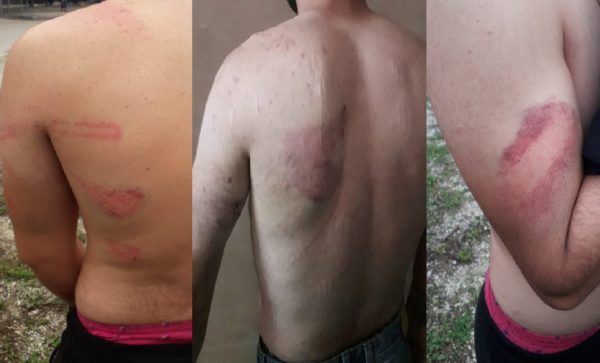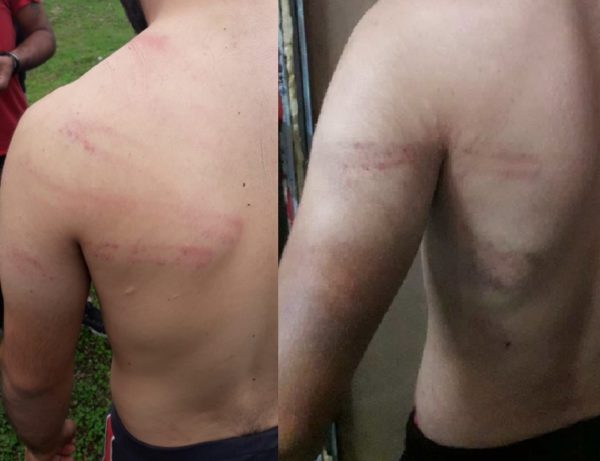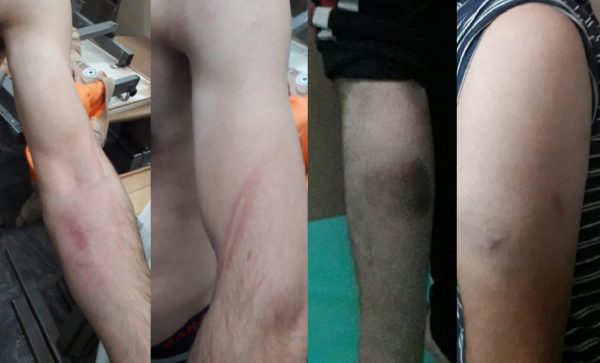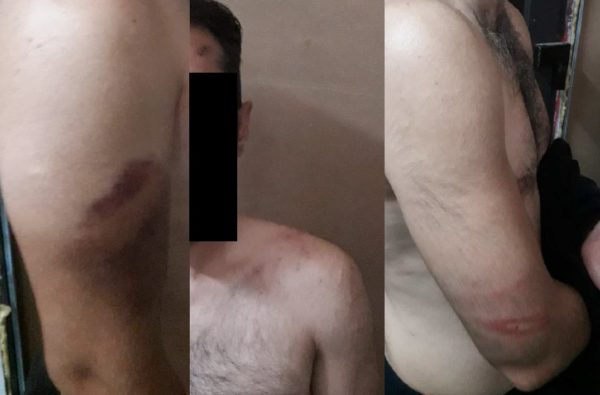Seven men were travelling on foot through the eastern Croatia before they encountered the Croatian police. The interviewee tells that their intention was to arrive at the northwestern city of Rijeka, on the Croatian coast.
At 5pm on 5th of November 2018 this group of Iranian males left the makeshift camp (known as Miral) in Polje, and walked south from the municipality of Velika Kladusa in Bosnia to reach the border area with Croatia. The group crossed the borders at dusk and the interviewee says they spent approximately six hours resting overnight in the forest before continuing on foot into Croatia. The following morning on 6th of November, at first light, the men continued their journey and walked for around twelve hours. The respondent tells that they were walking in exposed woodland around 20 km south of Slunj, near the village of Novo Selo, when they were observed by a stationary white police van. The time was approximately 4pm.
”We couldn’t hide, it was fall.”
Unable to conceal their position from the police, the men tried to move away from the vehicle, heading in the opposite direction into the forest. They followed a track in the woods, but as it bent around a low hill, they were apprehended by four Croatian police officers dressed in black uniforms. About the police the respondent remarked:
”[They were] border police, it was obvious.”
These officers made the group sit down on the track and wait in silence while they called a colleague. Soon another male officer dressed in similar black uniform arrived on the scene. The men were ordered to:
”Stand up and follow me.”
The seven men were made to march in escort by these five officers and brought to a village a short distance away. The men were ordered again to sit down, this time on the roadside in a semi-residential area where there were houses. The respondent says that they were forced to sit on the ground, while local Croatians walked past. The officers frisked the bodies and removed the belongings of the men in front of the civilian witnesses. At this time the victims asked the police for the opportunity to make an asylum claim in Croatia. But the officers only responded by laughing and insulting the group in Croatian.
”The same thing happened before [when asking for asylum]. They [the Croatian police] didn’t even listen.”
The respondent tried to reiterate his intention for asylum, telling the police that he was being persecuted in Iran for his Christian faith. He asked the officers:
”Aren’t you Christian?”
To which he said they replied:
”We hate all of you, doesn’t matter if you’re Christians, only because you are from the Middle East.”
After the body searches and theft of possessions the men were loaded into a white combi vehicle. This was brought by an officer as they were sat crouched in the village. All seven individuals were put into the rear passenger area of the van. The man interviewed describes how the heat in the back of the combi was raised by a thermostat, so that the journey to the border was nauseous.
The trip took around 30 minutes and when the van was stopped, the back doors were opened to the passenger area. It was dark outside, and they had arrived at the rural border area (Croatian farmland on the border with Bosnia, close to Bosnian town Zagrad) at around 6 pm.
At the back of the van stood a circle of four officers dressed also in black. They wore face masks, so the respondent could not see any identifying features. One of the officers beckoned them out one by one. As each of the victim came out, the Croatian officers beat the men with police issued batons and kicked at their shins with reinforced black boots. The officers struck the men over the head and on the torso with the truncheons, and kicked their ankles and lower legs. Once these four officers had finished with each man, they shouted at the victims to pass through a small gap in the bushes (in the direction of BiH territory). The respondent shares how:
”They [the Croatian officers] told us to run.”
The men were pushed through into a small track and believed they were being set free back into Bosnia. But at the end of the short path were four more officers in black concealed. The further ambush also wore black Croatian police uniforms and were wearing face masks. They struck the men with batons and kicked/tripped them as they emerged from the bushes. The whole ordeal lasted around 10-15 minutes, after which all the eight officers returned to their vehicles and left.
All the men were severely injured and disorientated. It was dark and they sat crouched in some bushes, waiting to see if the Croatian officers would return. When they felt it was safe to move they began walking, trying to find their bearings and return to Velika Kladusa. However it was dark and they were unable to recognise the terrain. The men spent a further night sleeping outside in the cold (with open wounds and bruising from the attack by Croatian police). In the morning they began to walk again, hoping to find their way.
However, the group accidentally walked into Croatian territory, bewildered by the open farmland. When the men saw a woman trying to make a phone call (which they believed was to the police), they realised they had crossed back into Croatia. They headed in the opposite direction and eventually found a road leading back through the west side of Zagrad into Bosnia. By this route they returned to the improvised sheltered accommodation near Velika Kladusa.
The injuries sustained are consistent with lateral strikes applied with extreme forced using a blunted smooth object such as a baton/truncheon. The scars are consistent with form of assault described above and were treated the following morning on 7th of November 2018 at Miral (improvised camp) by the MSF field clinic.




